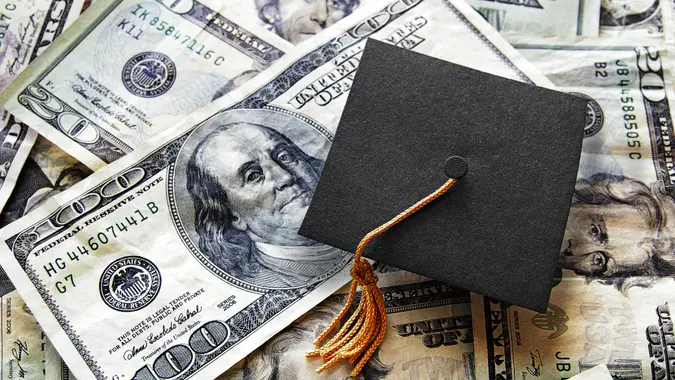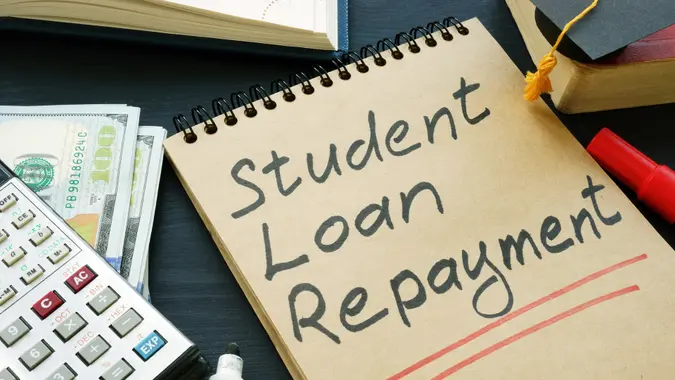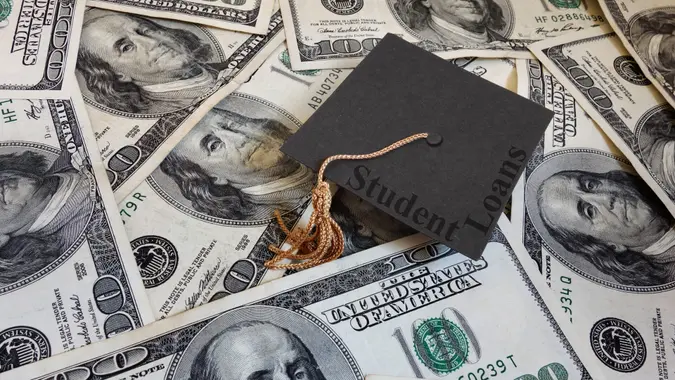I’m a Loan Expert: 3 Reasons You Shouldn’t Pay Off Your Student Loans Early

Commitment to Our Readers
GOBankingRates' editorial team is committed to bringing you unbiased reviews and information. We use data-driven methodologies to evaluate financial products and services - our reviews and ratings are not influenced by advertisers. You can read more about our editorial guidelines and our products and services review methodology.

20 Years
Helping You Live Richer

Reviewed
by Experts

Trusted by
Millions of Readers
After you’ve graduated from college, be that undergraduate, graduate or both, student loans can often feel like a weight dragging your finances down that you’d like to get out from under as quickly as possible.
If you find yourself able to pay them off earlier than they’re due, you might want to pause before you do so, however.
Experts explained why it might not be best for your finances to pay off your loans early.
Pursuing Loan Forgiveness
If a student loan borrower is pursuing any kind of forgiveness, they should try and pay as little as possible each month on their loans, according to Glenn Sanger-Hodgson, a certified student loan professional (CSLP) and founder of Shonan Gold Financial LLC.
“Money is an emotional topic, and when it comes to debt, we’ve all kind of learned that debt is bad, and paying off as much debt as quickly as you can is good. But when it comes to student loan forgiveness, whether that’s through the Public Service Loan Forgiveness (PSLF) program, or through time-based forgiveness on an income-driven repayment (IDR) plan, less is more.”
The reason behind this is that the less you pay each month, the more of the loan that is forgiven. And the more that is forgiven, the less you pay over the life of the loan.
“That’s more money left over that you can use for other goals, like paying down debt or saving for retirement, than if you had put extra money towards your loans,” Sanger-Hodgson said.
Even if you have the money to pay off your loans, pursuing forgiveness and sticking with it can make you more well-off financially in the long run, he suggested.
Meeting Other Financial Goals First
Another thing to consider is that there are better uses for your cash that can help you meet other financial goals. Sanger-Hodson pointed out that each month student loan borrowers have a minimum required payment, depending on their chosen repayment plan. That amount can even be as low as zero under some circumstances.
“The natural tendency can be to … apply extra payments there, but for borrowers who have other financial goals, whether it’s paying off debt, saving or investing, I would encourage them to think about the nature of interest,” Sanger-Hodgson said.
Student loans accrue interest as “simple interest,” Sanger-Hodgson explained. That means you don’t end up accruing interest on interest like you might with other debt, like a credit card or personal loan, only on the principal.
“Over time, this means that you will likely pay less in interest over time compared to a similar debt with a similar interest rate that compounds.”
Thus, if you have other debts to pay off first, especially high-interest credit cards or loans, you’re better off putting your extra cash there first.
Saving For Retirement First
Similarly, if a borrower is debating whether to pay off their student loans or save for retirement, Sanger-Hodgson reminded us that “retirement contributions compound over time while student loans don’t.
“While it would be nice to be debt-free sooner, using extra cash for other financial goals that compound is usually the better move in the long run,” he said.
 Written by
Written by  Edited by
Edited by 
























